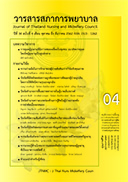Factors Related to Executive Functions in Preschool-Aged Children
Keywords:
executive functions, child development, parenting behaviors, parental stressAbstract
Objective: This study was explore executive functions of preschool-aged children, to examine the relationships between, receptive language development, parenting behaviors, parental stress, and executive functions of preschool-aged children.
Design: Correlational study design.
Methodology: The sample was 100 pairs of parents/guardians and their preschool-aged children aged 3-5 years who attended three childcare centres or kindergartens in Ban Pong district, Ratchaburi province. The data-collecting instruments were 1) a personal information questionnaire; 2) the Alabama Parenting Questionnaire (APQ); 3) the 10-item Perceived Stress Scale (T-PSS-10); and 4) the MU-EF 101 form for preschool-aged children The receptive and expressive language development was screened using the Developmental Surveillance and Promotion Manual (DSPM). The data were analysed using the Mann Whitney
U test and Spearman’s correlation analysis.
Results: Preschool-aged children participating in the study displayed a very high standardised T score for executive functions (M = 61.59, SD = 8.18). Their receptive and expressive language development was in positive correlation with their executive functions (Z = 3.36 and 5.059, p < .001, respectively). The parents’ punitive/corporal behaviour was positively correlated with the children’s executive functions (r = .27, p < .05), whereas the parents’ stress was negatively correlated with the children’s executive functions (r = -.44, p < .01).
Recommendations: Healthcare personnel should cooperate with teachers and child caregivers to enhance parents/guardians’ knowledge and understanding of how to effectively promote development of executive functions in preschool-aged children. Together, teachers, caregivers and parents/guardians should be encouraged to jointly screen children's development. Furthermore, assess parenting behaviors and parental stress when the parents bring their children to receive health services.
Downloads
References
for assessment of executive function in early childhood [internet]. 2017 [cited 2018 March 13]. Available from:
https://kb.hsri.or.th (in Thai)93
2. World Health Organization. Early child development - child health and development [internet]. 2016
[cited 2018 March 11]. Available from: https://www.who.int/topics/early-child-development/childhealth-development/en/.
3. Shonkoff J. In Brief: the science of early childhood development. [internet]. 2015 [cited 2018 March 1].
Available from: https://46y5eh11fhgw3ve3ytpw xt9r-wpengine.netdna-ssl.com/wp-content/uploads/2015/05/inbrief-adversity-1.pdf
4. Willoughby MT, Magnus B, Vernon-Feagans L, Blair CB, Investigators FLP. Developmental delays
in executive function from 3 to 5 years of age predict kindergarten academic readiness. J Learn DisabilI. 2017;50(4):359-72.
5. Mofftt TE, Arseneault L, Belsky D, Dickson N, Hancox RJ, Harrington H, et al. A gradient of childhood
self-control predicts health, wealth, and public safety.Proceedings of the National Academy of Sciences;
2011;108(7):2693-8.
6. Meuwissen AS, Carlson SM. Fathers matter: the role of father parenting in preschoolers’ executive function
development. J Exp Child Psychol. 2015;140:1-15.
7. Devine RT, Hughes C. Relations between false belief understanding and executive function in early childhood:
a meta-analysis. Child Dev. 2014;85(5):1777-94.
8. Gooch D, Thompson P, Nash HM, Snowling MJ, Hulme C. The development of executive function and
language skills in the early school years. J Child Psychol Psyc. 2016;57(2):180-7.
9. Kuhn LJ, Willoughby MT, Wilbourn MP, Vernon-Feagans L, Blair CB, Investigators FLPK. Early communicative
gestures prospectively predict language development and executive function in early childhood. Child Dev.
2014;85(5):1898-914.
10. Ardila A, Rosselli M, Matute E, Guajardo S. The influence of the parents’ educational level on the
development of executive functions. Dev Neuropsychol.2005;28(1):539-60.
11. Cuevas K, Deater-Deckard K, Kim-Spoon J, Watson AJ, Morasch KC, Bell MA. What’s mom got to do with it? Contributions of maternal executive function and caregiving to the development of executive function
across early childhood. Developmental Sci. 2014;17(2):224-38
12. Sulik MJ, Blair C, Mills-Koonce R, Berry D, Greenberg M. Early parenting and the development of externalizing
behavior problems: longitudinal mediation through children’s executive function. Child Dev. 2015; 86(5):1588-603.
13. Sosic-Vasic Z, Koner J, Schneider S, Vasic N, Spitzer M, Streb J. The association between parenting behavior
and executive functioning in children and young adolescents. Front Psychol. 2017;8:472.
14. Phinthong P., Chaimongkol N., Pongjaturawit Y. Family Factors Related to Executive Function
Development in Preschool Children [Thesis]. Chonburi: Burapha University; 2018.
15. Blair C, Granger DA, Willoughby M, Mills‐Koonce R, Cox M, Greenberg MT, et al. Salivary cortisol mediates effects of poverty and parenting on executive functions in early childhood. Child Dev. 2011;
82(6):1970-84.
16. Wagner SL, Cepeda I, Krieger D, Maggi S, D’Angiulli A, Weinberg J, et al. Higher cortisol is
associated with poorer executive functioning in preschool children: The role of parental stress, parent
coping and quality of daycare. Child Neuropsychol.2016;22(7):853-69.
17. Vygotsky L. Mind in society: The development of higher psychological processes. Cambridge: Harvard University Press; 1978.94
18. Diamond A. Want to optimize executive functions and academic outcomes. Child Psychol 2014;37:205-32.
19. Kaufman C. Executive function in the classroom: practical strategies for improving performance and
enhancing skills for all students. Baltimore: Paul H Brookes; 2010.
20. Frick P. The Alabama parenting questionnaire. [internet].1991 [cited 2018 March 2]. Available from: https://
cyfar.org/alabama-parenting-questionnaire.
21. Ministry of Public Health. Annual report 2017 [internet]. 2017 [cited 2018 March 11]. Available from: https://nich.anamai.moph.go.th (in Thai).
22. Wongpakaran N, Wongpakaran T. The Thai version of the PSS-10: an investigation of its psychometric
properties. Biopsychosoc Med. 2010;4(1):6.
23. Xing X, Wang M, Wang Z. Parental corporal punishment in relation to children’s executive function and externalizing
behavior problems in China. Soc Neurosci. 2018;13(2):184-9.
24. Roskam I, Stievenart M, Meunier J-C, Noël M-P. The development of children’s inhibition: does parenting matter?. J Exp Child Psychol. 2014;122:166-82.
25. Aro T, Laakso M-L, Maatta S, Tolvanen A, Poikkeus A-M. Associations between toddler-age communication
and kindergarten-age self-regulatory skills. J Speech Lang Hear R. 2014;57(4):1405-17.
26. Cadima J, Barros S, Ferreira T, Serra-Lemos M, Leal T, Verschueren K. Bidirectional associations
between vocabulary and self-regulation in preschool and their interplay with teacher–child closeness and autonomy support. Early Child Res Q. 2019;46:75-86.
27. Slot PL, von Suchodoletz A. Bidirectionality in preschool children’s executive functions and language
skills: is one developing skill the better predictor of the other?. Early Child Res Q. 2018;42:205-14.
28. Vernon-Feagans L, Willoughby M, Garrett-Peters P. Predictors of behavioral regulation in kindergarten: household chaos, parenting, and early executive functions. Dev psychol. 2016;52(3):430.








